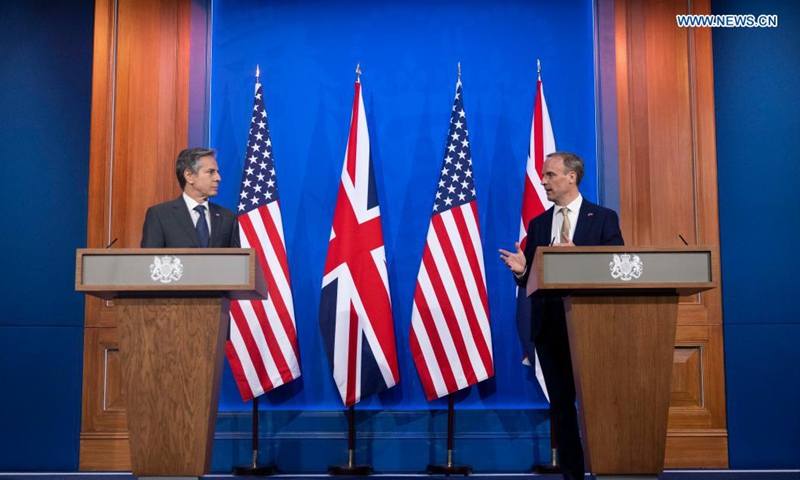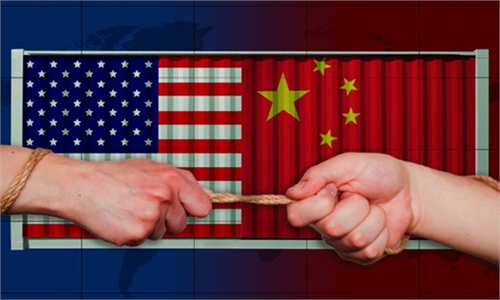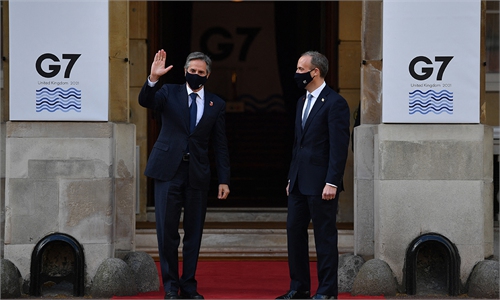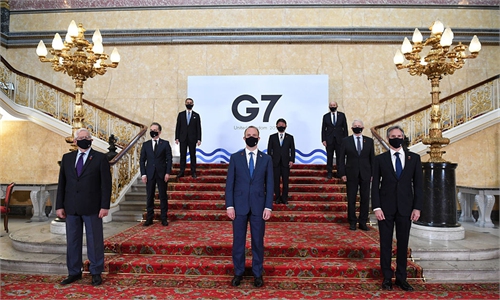
British Foreign Secretary Dominic Raab (R) and U.S. Secretary of State Antony Blinken attend a press conference ahead of the meeting of the Group of Seven (G7) foreign and development ministers in London, Britain, on May 3, 2021. British Foreign Secretary Dominic Raab on Monday met with U.S. Secretary of State Antony Blinken to discuss efforts to build back better from COVID-19 and a possible free trade agreement between the two countries. (Simon Dawsond/No 10 Downing Street/Handout via Xinhua)
Following the "China threat" hype in the G7 meeting, US Secretary of State Antony Blinken will meet Chinese State Councilor and Foreign Minister Wang Yi on Friday at a virtual United Nations Security Council meeting.
Blinken had just discussed Beijing's "challenge" in the G7 meeting but refused to call the US-China competition a "new Cold War."
A Wednesday-issued statement by the foreign ministers of G7 countries tried to reaffirm their leadership by outlining China and Russia as "threats" and listing issues regarding China's Xinjiang, Hong Kong, Tibet and Taiwan, but no concrete steps of confrontation were disclosed.
The discrepancies are regarded by Chinese experts as signaling the US' prowess falls short of its ambition in trying to dominate China-US relations since the Alaska talks in March, a contrast to China's consistency and confidence in the bilateral ties.
Observers said that the G7 joint statement shows the US and its allies used the old-fashion slanderous rhetoric against China, which shows less and less confidence in their China policy. Under such circumstances, China's hosting of the Security Council meeting will further expose the fake multilateralism of the US and competition in the guise of cooperation.
Lü Xiang, a research fellow at the Chinese Academy of Social Sciences in Beijing, told the Global Times on Friday that instead of multilateralism, the US is practicing "several-lateralism," through bullying allies into making rules and excluding dissent.
China is committed to multilateralism with the UN Charter at the center and China has always won more support from other countries on key agenda, the expert said.
Analysts said that the anti-pandemic cooperation, global economic recovery, and regional security issues will be major concerns for both China and the US at Friday's Security Council virtual meeting, but none of these issues can be resolved without China-US cooperation.
By recently denying that China and the US face a "Cold War" and the US was not aiming to "contain China" but to "uphold this rules-based order," Blinken's remarks were viewed as a sign of losing clout, as well as seeking cooperation.
Li Haidong, a professor at the Institute of International Relations at China Foreign Affairs University, told the Global Times on Thursday that what China really cares about is whether the US' will to cooperate would materialize.
The actions of the US against China reflect the intention to contain. The US diplomatic discourse is reluctant to use this powerful phrase to explain its actions in order to avoid taking responsibility for creating confrontation and divisions in the world, Li said.
In the face of complex international issues, China is willing to cooperate with the US, but Washington sees cooperation from the angle of competition, which pushes away its potential partners, said Li, noting that the Biden administration is making a policy transition, cooperating in the short term and competing in the long term.
"It will take some time for the Biden administration to come to a clearer understanding of its own strength and international reality… If it collides with China in a 1v1 fashion, it won't take any advantage," Lü said.
Europe has neither the need nor the will to confront China. And even within the G7 group, it is difficult for them to adopt a coherent China policy, Lü said.
The Biden administration has no guarantee that its commitment to allies and cooperation with China will be kept by a GOP administration after they leave office, Li said.
China wants cooperation with the US to be sustainable, but given domestic political problems in the US, full trust in the US is likely to mean being played by the US, the expert said.




